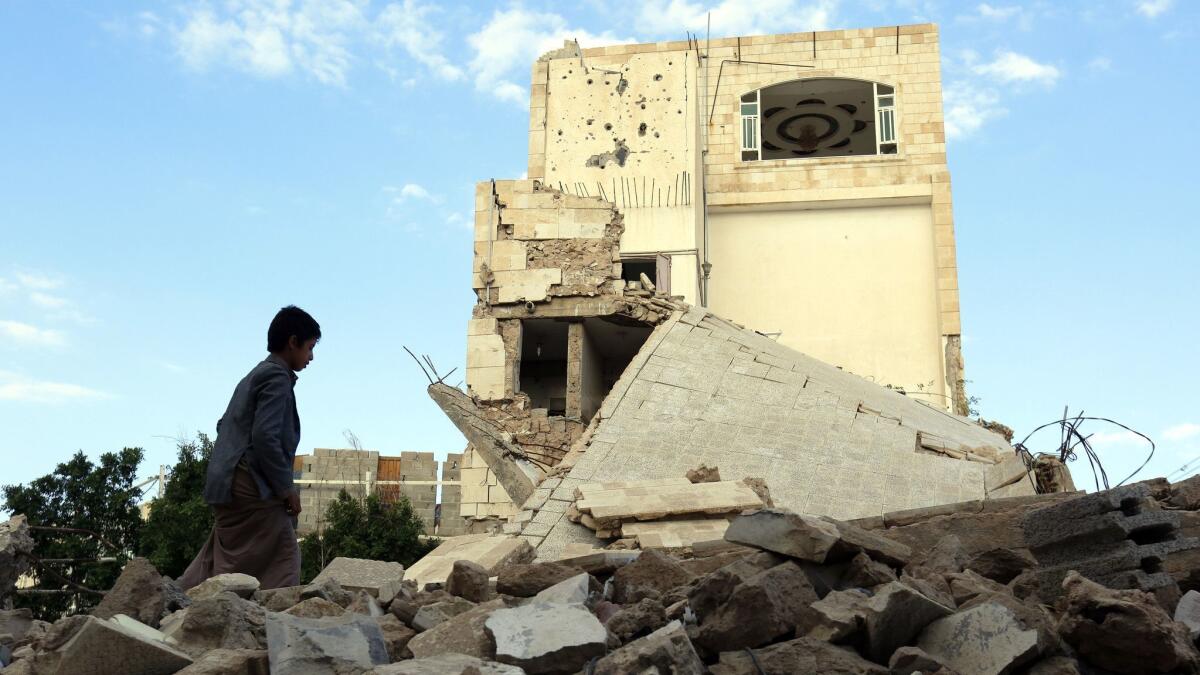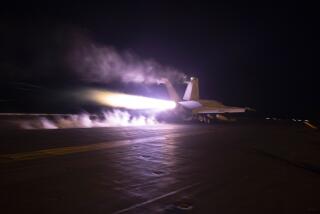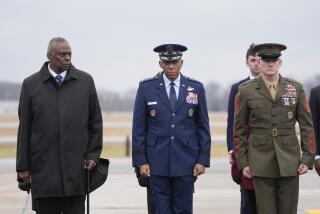Editorial: Saudi leaders are on the defensive. Let’s push them to bring the atrocious war in Yemen to an end

The United States has aided Saudi Arabia and its allies in their often indiscriminate campaign against Iranian-supported insurgents in Yemen, making this country complicit in a humanitarian disaster of horrific proportions. In addition to the more than 17,000 civilians killed and injured by the United Nations’ conservative count, millions have been left homeless and beset by disease and starvation. Now the Trump administration is finally moving to try to end the conflict.
On Tuesday, Secretary of State Michael R. Pompeo called on both the Saudi-led coalition and Houthi rebels who control much of the country to move to a cease-fire so that U.N.-sponsored negotiations on a political settlement can proceed. He added that a “cessation of hostilities and vigorous resumption of a political track will help ease the humanitarian crisis as well.”
But Pompeo suggested that the Houthis had to make the first move, specifically by ending missile and drone strikes on targets in Saudi Arabia and the United Arab Emirates. “Subsequently,” Pompeo said, “coalition airstrikes must cease in all populated areas in Yemen.” That “subsequently” provided an opening for the coalition to continue its air campaign. On Friday, it conducted airstrikes on Sana, the Houthi-occupied capital.
Enter the Fray: First takes on the news of the minute from L.A. Times Opinion »
The administration’s call for a cease-fire is unlikely to have much impact unless the U.S. makes clear to the Saudis that it is prepared to end its support if the Saudi side refuses to de-escalate. The U.S. has been supplying the coalition with weapons, refueling some of its warplanes and sharing intelligence.
Congress has attempted to condition that support on serious efforts by the coalition to minimize civilian casualties. But the administration has continued to give the Saudis the benefit of the doubt.
Pompeo, seconded by Secretary of Defense James N. Mattis, certified in September that Saudi Arabia and the United Arab Emirates were undertaking “demonstrable actions to reduce the risk of harm to civilians and civilian infrastructure resulting from military operations” in Yemen. Pompeo came to that questionable conclusion even though he acknowledged that “civilian casualties have occurred at rates that are far too high.”
It seems obvious that the administration’s view of the coalition’s compliance was shaped by its partiality toward Saudi Arabia. It has seen the kingdom as a bulwark against Iranian influence and a potential partner in negotiating peace between Israel and the Palestinians.
With Saudi leaders on the defensive after the appalling murder of journalist Jamal Khashoggi, the Trump administration may have more leverage to insist that the kingdom change its behavior in Yemen or face a loss of U.S. support. It should use that influence to help bring this atrocious war to an end.
Follow the Opinion section on Twitter @latimesopinionand Facebook
More to Read
A cure for the common opinion
Get thought-provoking perspectives with our weekly newsletter.
You may occasionally receive promotional content from the Los Angeles Times.






